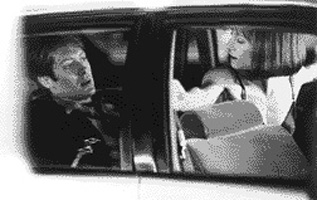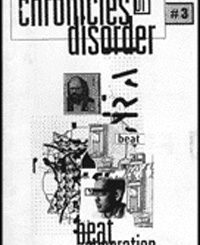 Crash
Crash
with James Spader, Deborah Kara Unger, Holly Hunter, Elias Koteas, and Rosanna Arquette
Based on the novel by J.G. Ballard
Written and Directed by David Cronenberg
(Fine Line Pictures)
by William Ham
Allow me to save the raincoat set a few bucks – Crash, in spite of its well-earned NC-17 rating and the controversy that’s delayed its American release almost a year (hey Mr. Turner, keep your nouveau riche nose out of art and go colorize something, okay?), is not a cross between Blood Runs Red on the Highway and Showgirls. True to the dark, contrary nature of both author J.G. Ballard and director David Cronenberg, Crash has far more troubling and complicated things on its mind than mere titillation on wheels. It is perhaps the most challenging film released by a (semi-) mainstream movie studio in years, a hypnotic meditation on sex, cars, and death that draws chillingly appropriate parallels to our particular late 20th-century malaise, the anthropomorphization of the mechanical and the depersonalization of the erotic.
 James Spader (taking a breather from his usual yuppie asshole roles) is James Ballard (mm-hmm), a film director whose sex life is already rather unconventional at the outset – he and his wife, Catherine (Deborah Kara Unger), trade grunts with other partners, then return to each other to compare notes. (The very first image in the picture is of Catherine touching her breast to the wing of an airplane – Turner might have blanched, but I’d bet Howard Hughes would approve.) Driving home one night, Ballard skids off the road and collides head-on with a car carrying Dr. Helen Remington (Holly Hunter) and her husband, who flies through the windshield and is killed. Their eyes meet as she struggles to unbuckle herself – or is she masturbating? In the hospital, Ballard is sized up by Vaughan (Elias Koteas), a scar-covered photographer who seems to have an abnormal interest in his injuries. As it transpires, Vaughan is something of a guru of vehicular perversion, leader of an underground society of car-crash victims who watch collision films like pornography and attend re-creations of famous car-crashes performed by him. Ballard and his wife are drawn into this vortex, meeting (and coupling with, in all configurations) the members of Vaughan’s inner circle (inner rotary?), particularly Gabrielle (Rosanna Arquette), who wears leg braces and a leather body suit that look like bondage gear. The rest of the film is a descent into a hellish sexual underground, as the road games accelerate into wilder, more desperate acts of highway depravity, a cheerless sport with only one way out of the game.
James Spader (taking a breather from his usual yuppie asshole roles) is James Ballard (mm-hmm), a film director whose sex life is already rather unconventional at the outset – he and his wife, Catherine (Deborah Kara Unger), trade grunts with other partners, then return to each other to compare notes. (The very first image in the picture is of Catherine touching her breast to the wing of an airplane – Turner might have blanched, but I’d bet Howard Hughes would approve.) Driving home one night, Ballard skids off the road and collides head-on with a car carrying Dr. Helen Remington (Holly Hunter) and her husband, who flies through the windshield and is killed. Their eyes meet as she struggles to unbuckle herself – or is she masturbating? In the hospital, Ballard is sized up by Vaughan (Elias Koteas), a scar-covered photographer who seems to have an abnormal interest in his injuries. As it transpires, Vaughan is something of a guru of vehicular perversion, leader of an underground society of car-crash victims who watch collision films like pornography and attend re-creations of famous car-crashes performed by him. Ballard and his wife are drawn into this vortex, meeting (and coupling with, in all configurations) the members of Vaughan’s inner circle (inner rotary?), particularly Gabrielle (Rosanna Arquette), who wears leg braces and a leather body suit that look like bondage gear. The rest of the film is a descent into a hellish sexual underground, as the road games accelerate into wilder, more desperate acts of highway depravity, a cheerless sport with only one way out of the game.
 It’s not enough to say that Crash will turn many viewers off – the extremity of Ballard and Croneberg’s vision is such that unprepared moviegoers are more likely to turn it off. The film consists almost entirely of sex and violence, but without eroticism. (The Ballards’ bedroom talk in one particularly explicit scene is extensive but clinical, like something out of a textbook.) Cronenberg takes no moral stance, makes no judgments about the good or evil of his characters, which is so far removed from the m.o. of almost any other filmmaker that it’s chilling. He gives the viewer no out, very little comedy or any other form of relief to dilute the power of this story (and, to be truthful, there’s not much story in the conventional sense). The only discordance here is in Koteas’ performance, which has its strengths (his single-mindedness is certainly believable), but is undercut with cartoonish touches that come off a little more villainous than intended. Yet that fault only stands out because the other performances are so haunting in and of themselves. Hunter and Arquette have never been braver – their characterizations are positively haunting, giving a sense of dark potentials opened up through their respective traumas; Remington seems to be in the morbid bloom of new, dark experience, while Gabrielle embodies the farthest end of those potentials – she, too, has ripened and started to rot. (This seems as good a place as any to mention the most daring moment in the picture, when Ballard performs an act on Gabrielle’s leg wound that recalls the human-VCR scene in Videodrome taken to its furthest, most literal extreme. Yow.) And Spader and Unger make a tragic couple, bound together in mutual frustration, incapable of release to the end. The emotional content of the film is in the aching lack of it, and they are the blackened, dying heart in the center of it all; innocents adrift in carnal neutral.It’s not hard to see why this film has offended so many sensibilities – there’s something extreme to it in its faux-pornographic surface, but when you begin to strip it away, it becomes even more of an affront. (At the screening I attended, the audience of jaded critics in the theatre kept erupting in uncomfortable giggles at the oddest moments – I can only imagine how this will play with John Q. Ticketholder.) Perhaps that’s the most off-putting thing about Crash – moviegoers expect, nay, demand sex and violence to butter their popcorn with these days, but Cronenberg laces it with burnt kernels of philosophy and existentialism that most will find hard to digest. This film is No Exit in more ways than one. You may love it, you may (more likely) hate it, but its power cannot be denied. My only advice is not to drive to the theatre. (And look, I got through the whole review without once using the word “autoerotic.” Somebody page the Pulitzer Committee.)
It’s not enough to say that Crash will turn many viewers off – the extremity of Ballard and Croneberg’s vision is such that unprepared moviegoers are more likely to turn it off. The film consists almost entirely of sex and violence, but without eroticism. (The Ballards’ bedroom talk in one particularly explicit scene is extensive but clinical, like something out of a textbook.) Cronenberg takes no moral stance, makes no judgments about the good or evil of his characters, which is so far removed from the m.o. of almost any other filmmaker that it’s chilling. He gives the viewer no out, very little comedy or any other form of relief to dilute the power of this story (and, to be truthful, there’s not much story in the conventional sense). The only discordance here is in Koteas’ performance, which has its strengths (his single-mindedness is certainly believable), but is undercut with cartoonish touches that come off a little more villainous than intended. Yet that fault only stands out because the other performances are so haunting in and of themselves. Hunter and Arquette have never been braver – their characterizations are positively haunting, giving a sense of dark potentials opened up through their respective traumas; Remington seems to be in the morbid bloom of new, dark experience, while Gabrielle embodies the farthest end of those potentials – she, too, has ripened and started to rot. (This seems as good a place as any to mention the most daring moment in the picture, when Ballard performs an act on Gabrielle’s leg wound that recalls the human-VCR scene in Videodrome taken to its furthest, most literal extreme. Yow.) And Spader and Unger make a tragic couple, bound together in mutual frustration, incapable of release to the end. The emotional content of the film is in the aching lack of it, and they are the blackened, dying heart in the center of it all; innocents adrift in carnal neutral.It’s not hard to see why this film has offended so many sensibilities – there’s something extreme to it in its faux-pornographic surface, but when you begin to strip it away, it becomes even more of an affront. (At the screening I attended, the audience of jaded critics in the theatre kept erupting in uncomfortable giggles at the oddest moments – I can only imagine how this will play with John Q. Ticketholder.) Perhaps that’s the most off-putting thing about Crash – moviegoers expect, nay, demand sex and violence to butter their popcorn with these days, but Cronenberg laces it with burnt kernels of philosophy and existentialism that most will find hard to digest. This film is No Exit in more ways than one. You may love it, you may (more likely) hate it, but its power cannot be denied. My only advice is not to drive to the theatre. (And look, I got through the whole review without once using the word “autoerotic.” Somebody page the Pulitzer Committee.)



